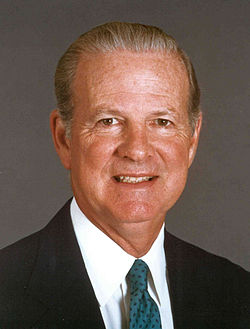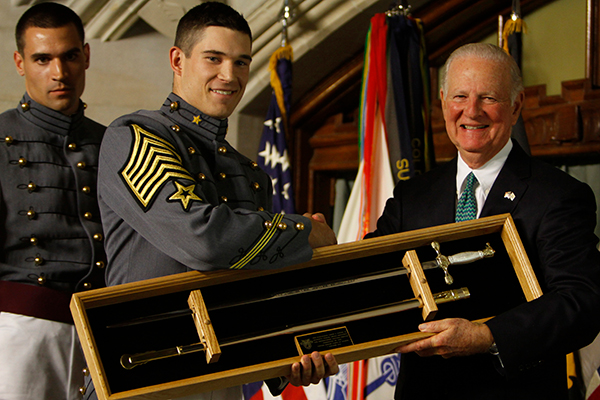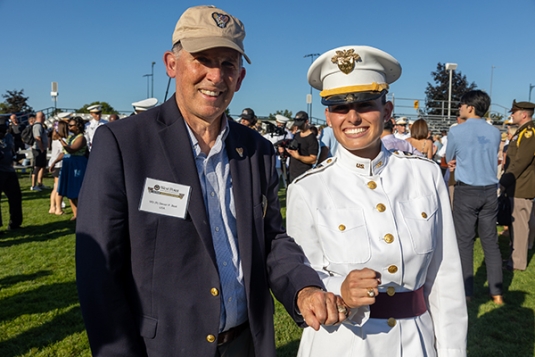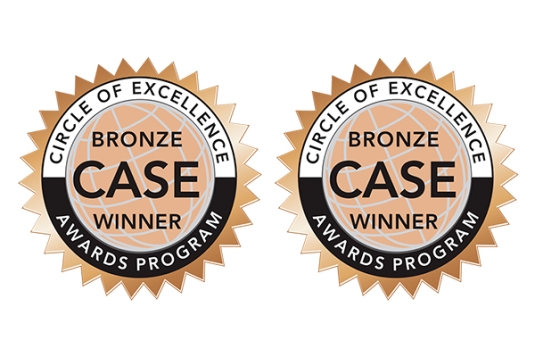James A. Baker, III, has compiled an extraordinary record of service to the United States of America in a public career spanning more than five decades. From his commissioning and service on active duty as a lieutenant in the United States Marine Corps, through a series of appointments at our nation’s highest levels, to his co-chairmanship of the Iraq Study Group and ongoing leadership of the James A. Baker III Institute for Public Policy at Rice University, Secretary Baker’s contributions to freedom and liberty have brightly and consistently reflected the tenets of Duty, Honor, Country.
A native of Houston, Texas, Secretary Baker graduated from Princeton University and The University of Texas School of Law. He also has received numerous honorary degrees and prestigious awards for public service to include the Presidential Medal of Freedom in 1991.
Secretary Baker’s high-level public service began in 1975 with his appointment as undersecretary of commerce in the Ford Administration. During 1981-1985, he served at the White House as chief of staff in the Reagan Administration. In 1985, he began three years of service as our nation’s 67th secretary of the treasury. Then, from 1989 to 1992, he served as our nation’s 61st secretary of state in President George H. W. Bush’s administration, traveling to ninety foreign countries and confronting the challenges and developing the opportunities of the post-Cold War era. Secretary Baker’s service in our nation’s capital concluded in the White House as chief of staff and senior counselor to President Bush from 1992 to 1993.
In recent years, Secretary Baker has been called on by the United Nations to serve as the secretary general’s personal envoy to the Western Sahara. He also has accepted assignments to study the Iraqi debt issue and U.S. election reform, in addition to his leadership of the Iraqi Study Group, which reported in 2006.
In recognition of this highly distinguished record of service to our nation, the West Point Association of Graduates proudly presents the 2010 Sylvanus Thayer Award to James A. Baker, III, a great American whose life has exemplified the ideals of the United States Military Academy.
Jodie K. Glore ’69
Chairman, West Point Association of Graduates
Speech
U.S. Military Academy at West Point
Thursday, Oct. 7, 2010
As prepared for delivery by James A. Baker, III
Thank you, Jodie, for that generous introduction.
General Huntoon, distinguished guests, and you, the great members of the Corps of Cadets— thank you for this remarkable, moving, impressive, and memorable day. I’m told you have a three-day weekend right after this event, so I promise not to talk too long.
When I was invited to receive this year’s Thayer’s Award, I was truly delighted to accept because it is a real honor for this former Marine to have a position along the Long Gray Line, even if only for this brief moment.
This is the second time I have had the privilege of addressing cadets here. The first time, General Howie Graves was the superintendent. General Graves was the representative of the Joint Chiefs of Staff on my airplane for three years when I was Secretary of State. He was a true American patriot and I miss him, as does our country.
I am delighted to be here for two other reasons.
The first has to do with my admiration for leadership. Despite my return to private life, I continue to be profoundly committed to American leadership in the global arena. So I can hardly imagine a better audience than this one, comprised as it is of many individuals who will shape American security policy for years and even decades to come.
The second reason I was pleased to accept this award is, frankly, personal. I retain a strong affection for, and commitment to, our men and women in uniform.
When I first became Secretary of State, I received a request from the Commandant of the Marine Corps to pay me a courtesy call. I quickly said,” Yes,” and a day or so later, General Al Gray walked into my office with a load of hardware on each shoulder. My highest rank in the Marine Corps was Captain and so I was blown away by all of those stars.
We had a brief but nice visit and, as he got up to leave, General Gray said: “Mr. Secretary, I have a gift of business cards for you.”
I opened the box and looked at one of the cards. Its background was Marine Corps combat camouflage. And there in the middle of the card, in big letters, it said: “James A. Baker, III—MARINE WARRIOR.” And underneath, in tiny little letters, it read: “And Secretary of State.”
Today, I keep what’s left of that box of cards on the desk of my office in Houston.
More than 50 years after I last wore a uniform, I remain a Marine and always will be a Marine. Just as each of you will always be “Army.” Service to country —and particularly military service—is encoded into our DNA
I look back on my time in the Corps with great pride, even if it was, in a word, “uneventful.” The lessons I learned in Basic School at Quantico and the tasks I performed as a naval gunfire spotter and battalion adjutant on active duty instilled in me discipline and sense of purpose that are the products of military training.
While I never had to face combat, I now realize my military service drilled into me very special characteristics that played critical roles in any successes I may have later had. Quite simply, I am a better man because of my military experience.
And so, allow me to discuss a half dozen of those special traits.
The first is the work ethic that military service instills. It is legendary.
To be fair, even before my training, my father had taught me the merits of what he called the 5 Ps—prior preparation prevents poor performance. Although it’s a simple aphorism that parents often tell their children, people are often surprised to learn that I still recite it. The point of the 5 Ps is that if you get up a little earlier in the morning, work a little later at night, then you will be more successful than others.
In the military of my day, the lesson of the 5 Ps was taught with vigor (although an additional, more “earthy” P was often added). You were taught to prepare over and over to “get it right” because if you don’t, everyone around you can suffer the consequences. It is that simple. Plan early and plan well, and you can be a success regardless of your mission, whether it is on the battlefield, in the realm of diplomacy, or in the business world.
Second, nothing concentrates the mind like military experience. When lives are on the line, all decisions are important.
When I returned to Texas and entered law school following my stint in the Marine Corps, I maintained a much sharper focus on my studies than I had previously as an undergraduate. I was much more mature by virtue of that military service. Looking back, I am not sure that this B student from Princeton University would have graduated with honors from law school without the attention and focus that I gained during my military service.
Third, discipline in both my personal behavior as well as my professional work were drilled into me. My personal appearance and deportment—polished shoes, neat suits, and moderation in drinking, eating, and spending—received attention in the Marines that lasted a lifetime. And professionally, I learned how to better prioritize my thoughts and organize my actions. Most importantly, I learned how to demand the best of myself.
Fourth, perhaps nothing defines soldiers as much as their ability to work together as a cohesive unit. If excellence is the goal of every soldier—and it is—then teamwork is the way it is attained. Such training helped me in virtually every job I have held since—from private law practice to running political campaigns to serving in the cabinets of Presidents.
Fifth, the “never-accept-defeat” perseverance that is so critical on the battlefield stuck with me. When faced with an obstacle, a soldier is taught to improvise, adapt and overcome. A soldier never gives up.
I may have been a little hard-headed before I joined the Marine Corps, but I damn sure was afterwards—even more so. Time and time again that trait has served me well.
For example, when I was Secretary of State, I met with Syrian President Assad in an attempt to convince him to change 25 years of policy and join a Middle East peace process. Even though Assad rejected my initial plea, I knew that his support was critical. So I returned. And returned. And returned.
Some may have thought I was too stubborn. I could have stopped going to Damascus after the first trip, or the sixth, or the seventh. But my military training said to keep going, to improvise, adapt, and overcome. On the eighth trip, Assad consented and the effort helped pave the way for the 1991 Madrid Conference, the first time ever that Israel and all of her Arab neighbors sat down face-to-face to negotiate peace.
Sixth, and last, is the importance of public service.
In the military, I learned that duty, honor and country are more than clichés. They are a way of life. I was proud, and remain proud, to have served my country in the military. And so, I have a “gut” understanding of the response that a wounded World War I soldier gave in a French hospital when asked if he was an American. “No, ma’am,” he replied. “I’m a soldier.”
Of course, my second call to public service came years after my time in the Marines. It was following the death of my first wife. To help me deal with my grief, my tennis partner and close friend—a gentleman named George H.W. Bush (a Navy pilot)—invited me to help with his campaign for the U.S. Senate. Although we lost that race, the experience led me to a long second career in politics, and its corollary, public service.
I have no doubt that my military service helped me tremendously in that career. Meanwhile, the pride for country that I gained as in the military led me to appreciate our great nation more than ever.
And so, let me stress something and stress it emphatically—the United States of America remains a great and powerful country.
I reject gloomy predictions about a “national eclipse.” I am absolutely convinced that our country’s future is a bright one. We remain the world’s economic, military, and diplomatic leader, and I believe we will for decades to come. Despite our current economic woes — and they are serious and must be addressed, particularly a looming debt bomb—American economic output represents almost a quarter of total global Gross Domestic Product. No other power, established or emerging, can match us in the military arena. We continue to exert immense diplomatic influence around the world. And our values, above all our support for political and economic freedom, retain wide appeal throughout the world.
As a result, my friends, and to paraphrase Mark Twain: the rumor of American demise is greatly exaggerated.
However, we are entering a new era. It will be an era in which global cooperation among nations will be even more important as we address a complex matrix of problems. These include, but are not limited to, international terrorism, the proliferation of Weapons of Mass Destruction, increasing demands on the world’s natural resources, and the mass migration of populations.
Of course, as we enter this new era, our military will face its own complex set of challenges. We cannot and should not be asked to serve as the world’s policeman. But the use of force will remain a fundamental element of our security strategy. And so, I would like to briefly mention just a few challenges that the Army and our other armed services will confront in the future.
First, our military must assure the strategic defense of the United States. This means the maintenance of nuclear and conventional forces sufficient to deter any current or potential enemy. That is job number one. I support discussions about stemming proliferation and reducing arsenals worldwide. We must also recognize that a flexible, state-of-the-art strategic nuclear deterrent remains a fundamental element of our national defense. And if we are pressed into war, there must be absolutely no doubt of the outcome.
Second, our military must continue to serve as a force for stability in critical regions around the world. Since World War II, our presence in Western Europe and Northeast Asia has helped foster peace and prosperity in regions once torn by conflict. Our armed services can and should continue this critical function. This is particularly true of Northeast Asia, where our presence in South Korea and Japan provides a deterrent to North Korean aggression.
The Middle East is also clearly a region of vital importance to the United States. Although we are winding down our involvement in Iraq, the stability that our military presence provides there will be needed for a while longer. And, we will need to maintain our various bases and pre-positioning agreements in the Persian Gulf to guarantee that we can act quickly and decisively should our interests there be threatened.
Third, our military should be prepared to project force worldwide in support of the war on terrorism. This support can include anything from full-fledged campaigns, such as the one now ongoing in Afghanistan, to surgical strikes and support for covert intelligence operations. Given the threat we face, flexibility will be crucial. In the war on terror, one size does not fit all.
And we must be prepared to act preemptively when the occasion demands it. Unlike nation-states, terrorist groups do not respond to containment or deterrence.
Fourth, our military must be prepared to take on a range of non-traditional tasks.
Clearly, the first priority of our armed services must be to defeat any and all adversaries in battle. But as the campaigns in Afghanistan and Iraq have demonstrated, our military must also stand ready to execute a variety of missions, including civil administration, public safety and economic reconstruction. As General David Petreaus told the Senate Armed Services Committee this past spring: “In many cases, a whole of government approach is required, one that integrates all the tools available to international and interagency partners to defeat transnational groups that pose a threat to the United States or our partners.” And so, our military must continue to be able to perform often as sort of “first responder,” providing services that traditionally and rightly fall under the purview of civilians.
I do not pretend that these four challenges will be the only ones the U.S. military will face. New threats will emerge and new opportunities will arise. But these four do, I believe, provide a good framework as we work to ensure that our military services have the capacity to protect our interests and promote our values.
Lastly—and most importantly—it is critical, ladies and gentlemen, that the American people and their government support our armed forces. The men and women of our military services deserve no less. They will do any job that we ask of them, and they do it superbly. They will do it because they have had the very best military training ever known to man. And they will do it because they hold true the ideals that keep us strong—Duty, Honor, Country.
In 1991, I had the privilege of addressing the 48th Tactical Fighter Wing just days before its pilots were to begin the air campaign to eject Iraq from Kuwait—Desert Storm. I have rarely been so moved in my life. I saw close up and personal the courage and commitment of those who were prepared to give their lives in the service of our great country.
Today, in Afghanistan and Iraq, we see the same heroism demonstrated day in and day out by the men and women of the Army, Air Force, Navy and Marine Corps.
And so, ladies and gentlemen of the Corps of Cadets, please accept my thanks and the thanks of all Americans, which you so richly deserve as “defenders of liberty.”
As a nation, we owe you and others like you a debt of gratitude we can never repay.
God bless you all, and God bless this nation.
Thank you.
Biography

James A. Baker, III, has served in senior government positions under three United States presidents. He served as the nation’s 61st secretary of state from 1989 through 1992 under President George H.W. Bush. While at the State Department, Baker traveled to 90 foreign countries as the United States confronted the unprecedented challenges and opportunities of the post–Cold War era. Baker’s reflections on those years of revolution, war and peace—“The Politics of Diplomacy”—was published in 1995.
Baker served as the 67th secretary of the treasury and chairman of the President’s Economic Policy Council from 1985 to 1988 under President Ronald Reagan. From 1981 to 1985, he served as White House chief of staff to President Reagan. Baker’s public service began in 1975 as undersecretary of commerce to President Gerald Ford. It concluded with his service as White House chief of staff and senior counselor to President Bush from August 1992 to January 1993. Additionally, Baker has led presidential campaigns for Presidents Ford, Reagan and Bush over the course of five consecutive presidential elections from 1976 to 1992.
A native Houstonian, Baker graduated from Princeton University in 1952. After two years of active duty as a lieutenant in the U.S. Marine Corps, he entered The University of Texas School of Law at Austin. He received his J.D. with honors in 1957 and practiced law with the Houston firm of Andrews and Kurth from 1957 to 1975.
Baker’s memoir—“Work Hard, Study . . . and Keep Out of Politics! Adventures and Lessons from an Unexpected Public Life”—was published in October 2006.
Baker received the Presidential Medal of Freedom in 1991, as well as many other awards for distinguished public service, including Princeton University’s Woodrow Wilson Award, the American Institute for Public Service’s Jefferson Award, Harvard University’s John F. Kennedy School of Government Award, The Hans J. Morgenthau Award, The George F. Kennan Award, the Department of the Treasury’s Alexander Hamilton Award, the Department of State’s Distinguished Service Award, and numerous honorary academic degrees.
Baker, currently a senior partner in the law firm of Baker Botts, is the honorary chairman of the James A. Baker III Institute for Public Policy at Rice University and serves on the board of the Howard Hughes Medical Institute. From 1997 to 2004, Baker served as the personal envoy of United Nations Secretary-General Kofi Annan to seek a political solution to the conflict over Western Sahara. In 2003, Baker was appointed special presidential envoy for President George W. Bush on the issue of Iraqi debt. In 2005, he was co-chair, with former President Jimmy Carter, of the Federal Commission on Election Reform. In 2006, Baker and former U.S. Congressman Lee H. Hamilton served as the co-chairs of the Iraq Study Group, a bi-partisan blue-ribbon panel that examined a forward-looking approach to Iraq.
Baker was born in Houston, Texas, in 1930. He and his wife, the former Susan Garrett, currently reside in Houston and have eight children and 17 grandchildren.





